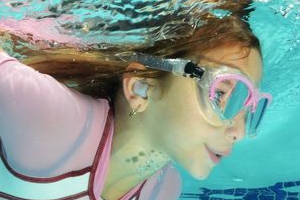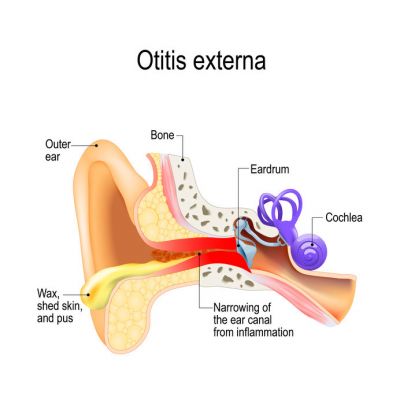|
www.HealthyHearing.com |
What is swimmer's ear?Water trapped in the ear canal can lead to a skin infection
Contributed by Joy Victory, managing editor, Healthy Hearing Key points:
What is swimmer's ear?Swimmer’s ear is the nickname for a bacterial infection of the skin of the ear canal, and it can be very painful. Also known as otitis externa, it affects millions of people every year, especially kids. How it happens
In simple terms, it is due to dirty water getting trapped in the ear canal, leading to an infection in the skin. All water contains bacteria, even pools. However, bacteria is more abundant in lakes, rivers and oceans, especially when its warmer outside. When this bacteria-laden water doesn’t drain properly from the ear canal, it becomes trapped. In the warm, moist environment of the ear canal, the bacteria multiply and cause an infection. The infection causes swelling and inflammation. Because the ear canal is small, the swelling and the resulting pain can be excruciating. More common in summer, and among kidsCases of swimmer's ear increase in the summer, with nearly half of cases occurring between June and August. It's also more common among kids, who have smaller ear canals, so water gets stuck more easily. But it can affect people of any age, especially frequent swimmers. Hearing aids and earbudsHowever, you don’t have to be a swimmer to get it. Sometimes just living in a hot and humid climate is enough for moisture to build up and become trapped, especially if you wear hearing aids or earbuds. Note: Swimmer's ear is different than a middle ear infection, which is also common in kids, but usually develops after an upper respiratory infection and affects a different part of the ear. Symptoms of swimmer's ear
painful inflammation and swelling is the result. The early symptoms include clogged ears and muffled hearing. If left untreated, intense pain, swelling and discharge usually develop. Symptoms include:
What is the treatment?Anyone with a suspected ear infection should receive professional medical care. The infection will not go away on its own. The treatment will depend on the severity of the infection, according to guidance from the American Medical Association. Mild cases can generally be treated with ear drops containing an antibiotic and steroid. The antibiotic kills the bacteria while the steroid reduces the painful swelling. If the infection penetrates deeper into the skin, oral antibiotics may be required, the AMA notes. Once treatment has begun, you will start feeling between within a couple of days. It's important to finish treatment even once you feel better, to prevent it from coming back. How to use ear dropsUsing ear drops can be a little tricky. In the AMA guidance, Pediatrician Douglas Eisert, MD, recommends the following steps to ensure the medicine reaches the infection: “Lay down on your side or tip your head toward the opposite ear before placing the drops. Place drops in the ear canal,” he explained. Next thing to keep in mind is to “stay on your side for three to five minutes so that the drops can cover your entire ear canal.” Lastly, “consider placing a cotton ball in the ear to keep drops in the canal,” he said. Keep the ears dryFor the infection to heal, doctors usually recommend no swimming for two weeks. In addition to no swimming (if kids must swim, use ear plugs and ear bands), during the course of treatment ears must be kept dry during bathing or showering; earplugs or cotton with petroleum jelly should be used to keep the moisture out of the ear area. Q-tips can increase swimmer's ear riskEarwax is protective. Removing earwax unnecessarily can lead to an increased risk of infection. In some cases, impacted earwax can be problematic, but follow your doctor's instructions on how to treat it. Any trauma or scratches to the skin of the ear canal can provide an entry point for the bacteria. People who are at higher risk of swimmer's ear include people use cotton swabs or Q-Tips in their ears, people who scratch their ears a lot, or those with eczema or psoriasis. It is not normal to have itchy ears. Can swimmers ear cause permanent hearing loss?Fortunately, symptoms of swimmer’s ear, including hearing loss, are temporary and get better with treatment. Can swimmer's ear cause tinnitus?Sometimes a ringing in the affected ear, known as tinnitus, can occur. This, too, is usually temporary and gets better with treatment. How do you prevent swimmer's ear?The best way to reduce the chances of getting swimmer’s ear is to take some easy precautions:
If you or your child develops swimmer’s ear, your summer fun doesn’t have to end. Seeing your physician or a hearing care professional to get treatment started right away will not only ease your discomfort, it will get you back in the water in no time. To find a clinic near you, visit our consumer-reviewed directory. Joy Victory, managing editor, Healthy Hearing
|
Featured clinics near me
Earzlink Hearing Care - Reynoldsburg
7668 Slate Ridge Blvd
Reynoldsburg, OH 43068

Find a clinic
We have more hearing clinic reviews than any other site!


 Joy Victory has extensive experience editing consumer health information. Her training in particular has focused on how to best communicate evidence-based medical guidelines and clinical trial results to the public. She strives to make health content accurate, accessible and engaging to the public.
Joy Victory has extensive experience editing consumer health information. Her training in particular has focused on how to best communicate evidence-based medical guidelines and clinical trial results to the public. She strives to make health content accurate, accessible and engaging to the public.